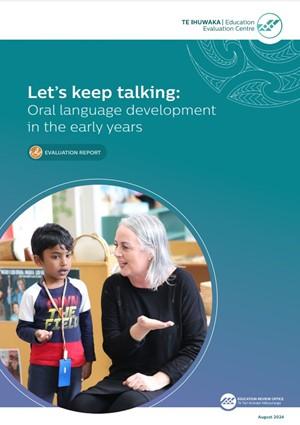
Tēnā koutou kātoa
Ngā mihi nui o te wā
As we journey towards the end of another year, I want to thank you for welcoming our reviewers to your service. We are privileged to work alongside you as we all strive to lift the quality of education and care for our youngest learners.
Quality early childhood education makes a difference. The expertise and practices of service leaders, teachers and educators are essential for enhancing children’s learning and developmental outcomes.
To ensure we can support every service to make quality improvements, we have made some refinements to our reviews. Services that have been reviewed this year will notice that we are more deeply focused on quality learning experiences, while remaining vigilant about the safety and care of children.
While some things have changed, we hold firm to our whakataukī, ko te tamaiti te pūtake o te kaupapa – the child, the heart of the matter.
In today’s newsletter, you’ll find further information about our review and reporting changes and what you can expect during the review process, our improvement framework, what’s coming next year, and a look at our latest research.
We welcome feedback from you at any time. Please make contact with your review officer if you have questions or comments for us at ERO.
I hope you and your team have a very Merry Christmas, and we look forward to working with you in the new year.

What's in this newsletter:
- Review and reporting updates
- Using the Improvement Framework
- How we gather evidence for reviews
- Providing feedback to ERO after a review
- What's coming in 2025
- Myth-busting!
- ERO's latest research
Review and reporting updates
In our July newsletter, we outlined some changes to our published reports and our review practice. We continue to align our reviews with each service’s individual context – we know that no two services are the same, and our quality evaluations reflect this.
Since our early beginnings, ERO has had a strong focus on supporting quality improvement in early childhood services. Over the years, our methodologies and approaches have evolved, and from time to time, we make changes to the way we review and what our published reports look like. This includes the way we describe our overall judgements in our reports.
What we used to say:
Prior to 22 July 2024, our judgements were: emerging, establishing, embedding and sustaining. Any non-compliances identified, depending on the risk to children, had an impact on the final overall judgement.
Now we say:
Now, our judgements are: improvement required, working towards, embedded and excelling. A separate judgement is made about health, safety and wellbeing.
As well as updating the terms we use to describe our overall judgements, we have adjusted our continuum. It is important to note that these new judgements do not align with our previous judgements i.e. sustaining doesn’t equate to excelling. A service that was described as “very well placed” (4-year return) does not equate to sustaining or excelling.
The threshold for quality
In our reports, we also determine whether a service’s practices are above or below the threshold for quality. We want every service to provide high quality education and care for all learners, and by supporting you and your team with your own internal evaluation to improve your practices, overtime, we want to see all early childhood services placed above the quality threshold.
Using the Improvement Framework
We have developed an Improvement Framework specifically for early childhood services.
By using the framework, you will be undertaking an important piece of internal evaluation. You will gain a good understanding of your own service’s practices and whether they currently sit below or above the threshold for quality. You’ll be able to identify the areas that you need to focus on improving, see examples of good practice, and what improvements you can make that will have a positive impact on your learners’ experiences.
You can download the framework from our website and read through each section, which describes practices across the continuum, from improvement required to excelling. You will find examples of high-quality practice to draw upon and set as your service’s priorities for improvement.
It’s vital that every service takes the time to consider and reflect on current practices and what needs more attention and planning. Your reviewer will discuss the framework with you during your review.

How we gather evidence for reviews
When our team reviews a service, our judgements are based on evidence. In most instances, our reviewers require three pieces of evidence, multiple methods or data sources to develop a comprehensive understanding before a judgement is made. This is called triangulation – where we seek to see, hear and read the evidence.
When you are working with our reviewers, we’re interested to know where you think your service sits on the Improvement Framework. To help support your own internal evaluation findings, it’s important to think about those three pieces of evidence and how you can demonstrate quality practice in your service.
Providing feedback to ERO after a review

When your ERO report is confirmed, we will send you a copy of your report with a confirmation letter via email. This confirmation letter contains a link to a Post Review Questionnaire (PRQ).
We encourage all services to fill out the PRQ! All comments are welcome. It's your opportunity to tell us about your review experience.
Your comments contribute to review officers’ performance achievements and improvements; targeting personal and group professional learning and shifts to our review and evaluation practice.
What's coming in 2025
We have developed a Pre-Review Information (PRIMs) video, replacing our pre-review meetings for services we are intending to visit. It means you and your staff can view the video at a time that suits you and revisit the information as needed.
The video will be on our website shortly, and a link to it will be added to the notification letter services receive when they are due for a review.
Our ECE reviewers are undergoing some professional learning and development on intentional teaching, so they are best placed to support your service's delivery of a rich curriculum. As we undertake this work, we will be developing some tools and resources that you can use in your service. We will share these with you next year.

Myth-busting!
The Ministry for Regulation (MfR) has been collecting feedback as part of its regulatory review into early childhood education. As a result of this feedback, the MfR has identified some misconceptions based around some ECE licensing criteria. In most cases, the misconceptions were making things more difficult than what the actual licensing criteria specified.
Misconception: Adults supervising children eating or carrying out sleep checks cannot be counted for ratio calculations.
Licensing criteria: Adults supervising children eating or undertaking sleep checks still count towards ratios.
Misconception: ECE providers must launder at a water temperature of 60°C.
Licensing criteria: The licensing criteria does not set a required temperature that linen must be washed at.
Misconception: For every load of laundry, a record is required for who, when and how the laundry was done.
Licensing criteria: There is no requirement to record who, when and how laundry has been done.
Misconception: Daily records of fridge temperatures must be documented.
Licensing criteria: There is no requirement in the Licensing Criteria to record fridge temperatures.
Misconception: Room thermometers must be attached to a wall at 500 mm above floor height to constantly monitor room temperature.
Licensing criteria: There is no requirement to have a thermometer attached to the wall.
Misconception: Sleeping children must be woken every 5-10 minutes.
Licensing criteria: Children do not need to be woken every 5-10 minutes. However, they do need to be checked at least every 5- 10 minutes for warmth, breathing and general well-being
Licensing criteria can be found on the Ministry of Education’s website.
The ECE regulatory review report is expected to be provided to the Minister for Regulation before the end of the year.
ERO'S LATEST RESEARCH

Let's keep talking: Oral language development in the early years
Oral language is the foundation for literacy and key to children’s success. ERO’s latest research has identified the best evidence-based teacher practices and supports for oral language development. These complement the new Oral Language and Literacy section of Kōwhiti Whakapae.
To help children get the best start in their language development, ERO has developed a suite of short, and easy to use good practice resources for ECE services.
ERO’s guide for ECE teachers highlights key practices, real-life examples, and reflective questions to build effective practice.
ERO’s guide for ECE leaders describes how leaders can support their services and team to provide high quality oral language teaching and learning for children.
Additionally, we have also produced a poster for ECE services. This is designed to be displayed in ECE staff spaces to quickly highlight the best practices for developing oral language and keep them top of mind.

To be added to our mailing list for this newsletter, please email us at ricomms@ero.govt.nz